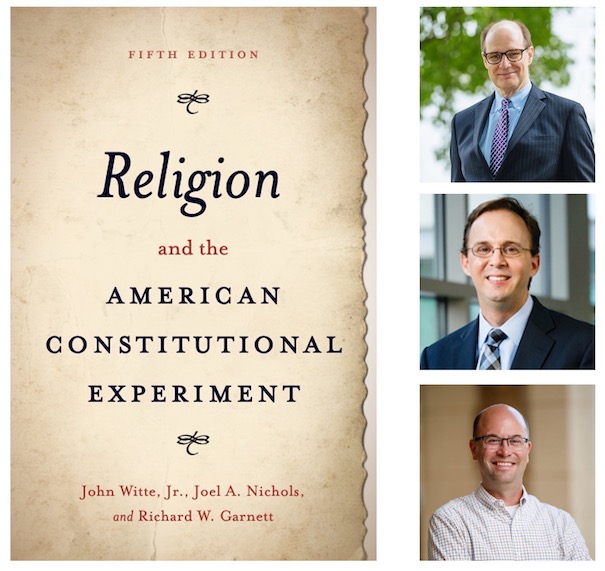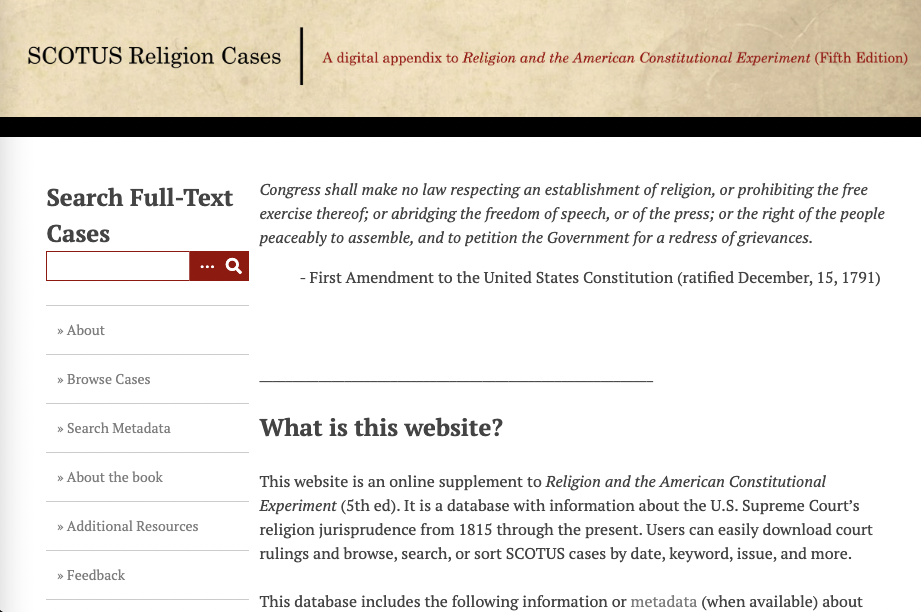Book Announcement: Religion And The American Constitutional Experiment, 5th Edition
By CSLR | Emory Law | Jun 16, 2022 7:06:00 AM

The Center for the Study of Law and Religion at Emory University is proud to announce the publication of Religion and the American Constitutional Experiment (5th edition) by John Witte, Jr., Joel A. Nichols, and Richard W. Garnett from Oxford University Press.
This accessible and authoritative introduction tells the American story of religious liberty from its colonial beginnings to the latest Supreme Court cases. The authors analyze closely the formation of the First Amendment religion clauses and describe the unique and enduring principles of the American experiment in religious freedom - liberty of conscience, free exercise of religion, religious equality, religious pluralism, separation of church and state, and no establishment of religion. Successive chapters map all of the 240+ Supreme Court cases on religious freedom - covering the free exercise of religion; the roles of government and religion in education; the place of religion in public life; and the interaction of religious organizations and the state. The concluding reflections argue that protecting religious freedom is critical for democratic order and constitutional rule of law, even if it needs judicious balancing with other fundamental rights and state interests.
Clear, comprehensive, multidisciplinary, and balanced, this classic volume is an ideal classroom text. This new 5th edition addresses fully the new hot-button issues and cases on religious freedom versus sexual liberty; religious worship in the time of COVID; freedom of conscience and exemption claims; state aid to religion; religious monuments and ceremonies in public life; and the rights and limits of religious groups. Read an excerpt from the introduction now on Canopy Forum!
“This magisterial revision of Religion and the American Constitutional Experiment is an accessible and authoritative guide through the remarkable but tortuous history of America's unique approach to religious freedom. Clear without over-simplification, comprehensive without pedantry, it portrays a system that enabled the United States to become a society where members of all religions and no religion could not only live together in relative harmony but flourish.”
– Mary Ann Glendon, Learned Hand Professor of Law emerita, Harvard University
Buy the book now!
Oxford | Amazon | B&N | Local Bookstore
The SCOTUS Religion Cases (SRC) Database
Accompanying the release of this 5th edition, we are proud to launch the SCOTUS Religion Cases (SRC) database — an open-access research tool that includes volumes of data, case summaries, and searchable PDFs of 244 (and counting) Supreme Court rulings from 1815 through the present day. Researchers and students can now use this tool to easily search, sort, download, read, and otherwise study the Supreme Court’s religion jurisprudence. The SRC database includes the following information about each case:
- Case name
- Case issue
- Case citation and date
- Text of the Supreme Court’s opinion(s) from U.S. Reports (downloadable PDF)
- Summary of the Court’s holding/ruling in each case
- Name of the justice(s) who authored the Court’s rulings
- Ratio of justices who supported or dissented from each opinion
- Religious tradition involved
- State or territory of origin
- Is the legal question(s) related to the free exercise and/or establishment clause?
- Is the law in question a local, state, or federal law?
- Penultimate court of appeal
- Penultimate court rulings (downloadable PDF)
Our team of researchers, led by Dr. Justin Latterell, collected, analyzed, and organized these data and documents from sources in the public domain over the past year. And the digital scholarship team at Emory’s Center for the Study of Law and Religion, led by Dr. John Bernau, worked closely with Emory’s Center for Digital Scholarship to build the online database and search tools.
The result is a comprehensive, centralized repository of court rulings that doesn’t require a subscription to existing legal databases that are often unaffordable and inaccessible for many scholars, law firms, students, and researchers. Read an overview of the site by two of the project leaders now on Canopy Forum!
[A screenshot of the website below]

Visit the site now!

